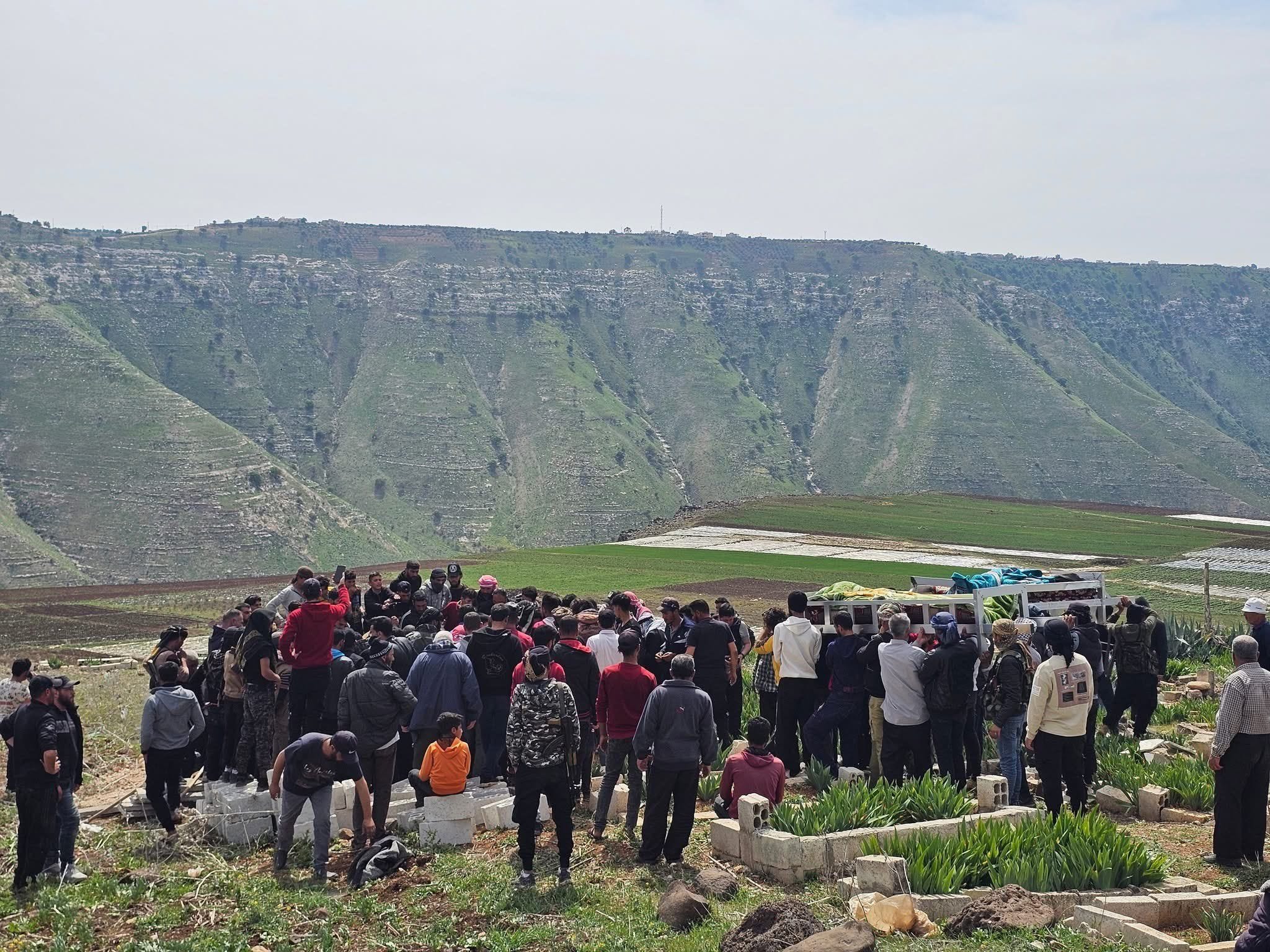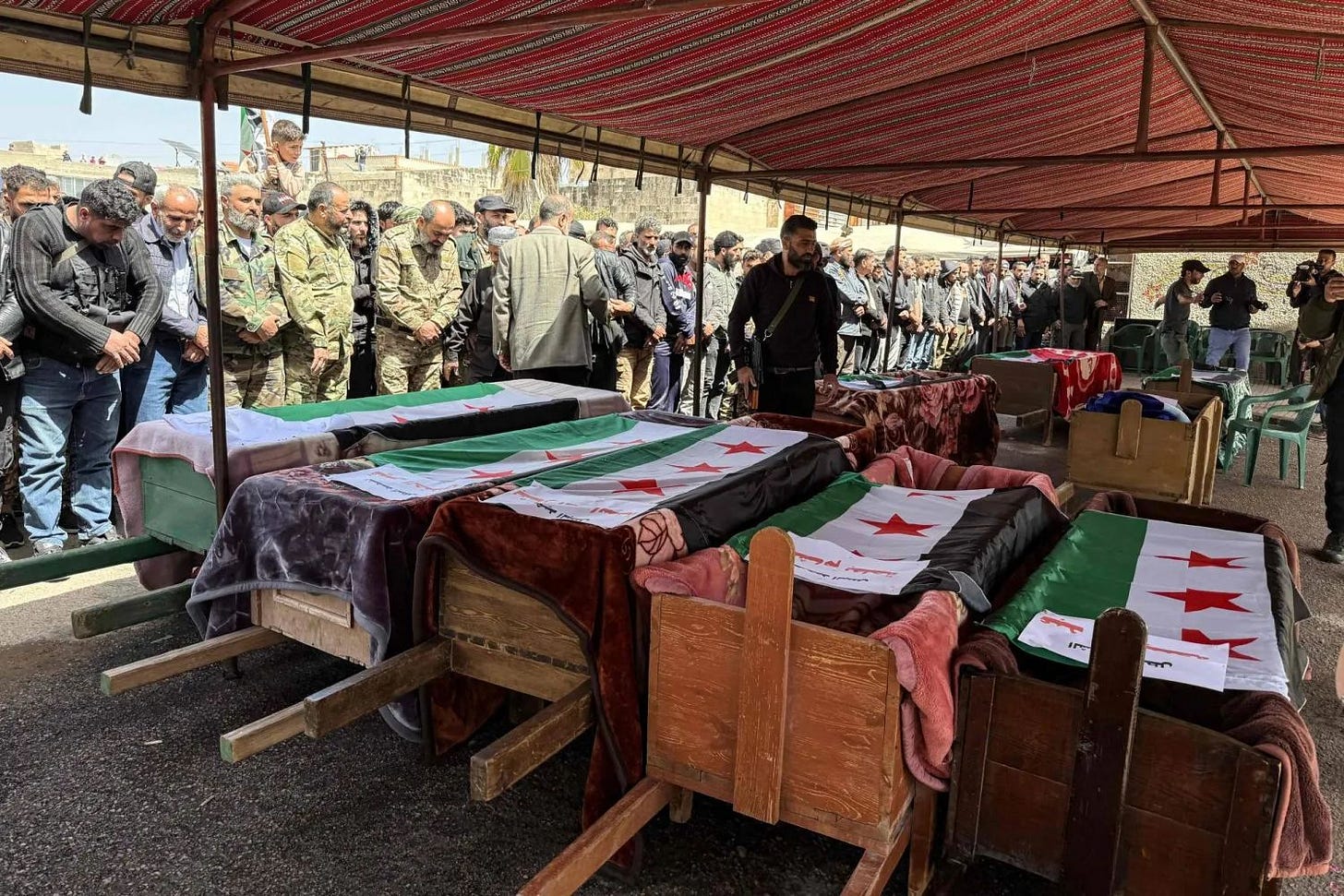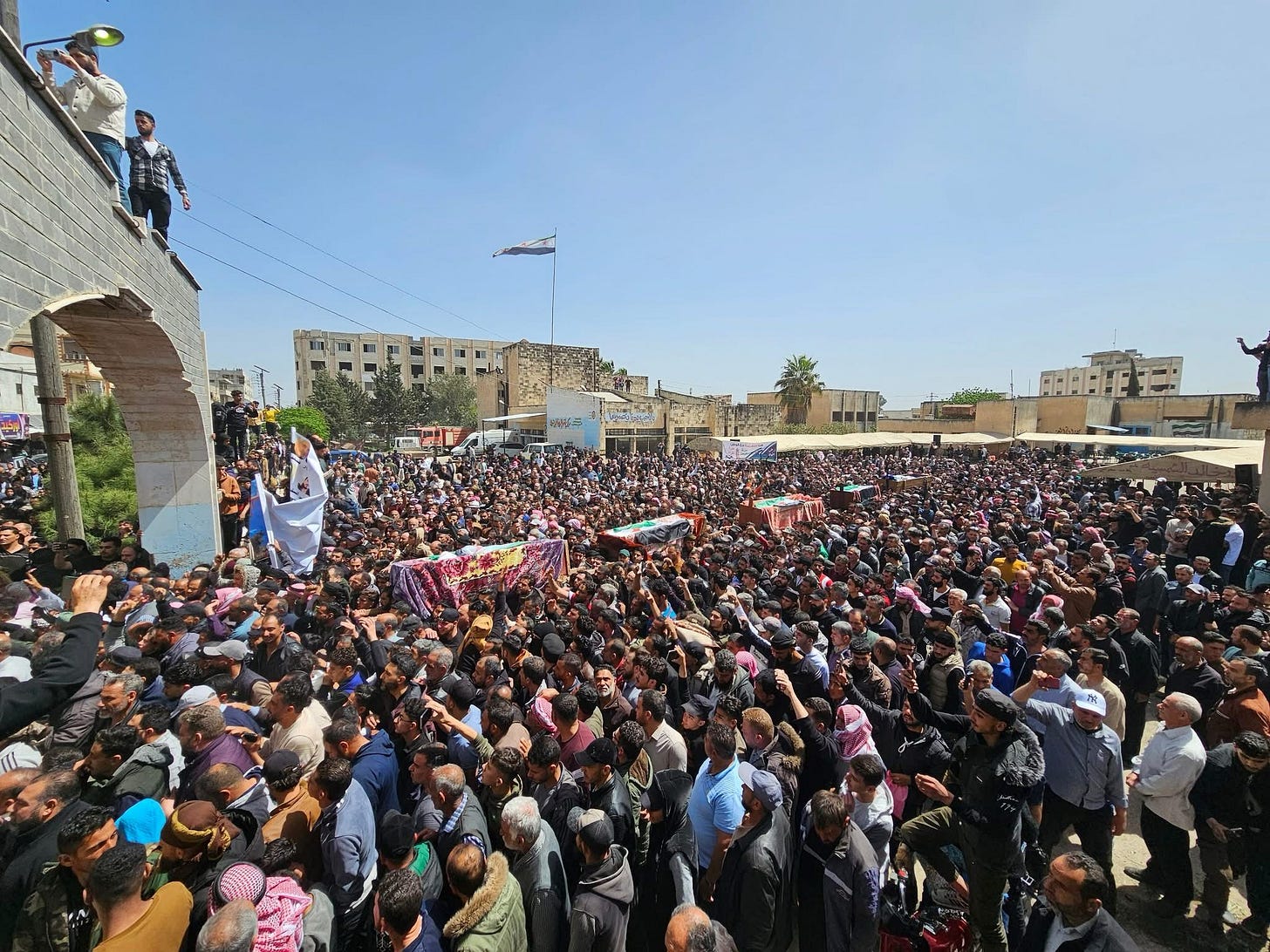Grassroots Resistance Builds Against Israeli Occupation of Southern Syria
Locals in southern Syria have begun taking up arms against an Israeli occupation of the region that began after the fall of the Assad regime.

Grassroots Resistance Builds Against Israeli Occupation of Southern Syria
By Murtaza Hussain
On April 3, thousands of Syrians took to the streets of the southern city of Daraa for a massive public funeral to mourn ten Syrians who had been killed in Israeli attacks the previous day. Daraa, where the earliest demonstrations in opposition to the former government of Bashar al-Assad took place in 2011, is now among the regions facing the brunt of an Israeli military offensive that began shortly after the collapse of the regime.
The public mourning gave way to demonstration, as the crowd raised chants lionizing the “martyrs of freedom” and “the martyrs of Gaza,” in reference to ongoing killings by the Israeli military in the besieged coastal enclave. Amid Israel’s ongoing war against the Palestinians of Gaza, and its military assault in Lebanon, Syria has rapidly become a new front, with airstrikes and ground attacks escalating in recent weeks. The Israeli military has now established bases on Syrian soil that it has vowed to not vacate, while conducting increasingly aggressive raids and incursions beyond a self-defined buffer zone on the border that the Israeli government has unilaterally created.
Israeli leaders have demanded that the new Syrian government completely demilitarize the south of the country, even vowing to take escalated military action as far north as the Damascus suburbs and directly threatening the rule of the new government. In a statement at a military ceremony in February, Netanyahu stated, "We demand the complete demilitarization of southern Syria, including the Quneitra, Daraa and Suwayda provinces.”
In response to these threats, the new Syrian government, led by former members of Hayat Tahrir al-Sham (HTS), has tried to strike a conciliatory tone and de-escalate tensions with Israel. "We do not want any conflict with Israel or any other party, and we will not allow Syria to become a platform for attacks,” Syrian president Ahmad al-Sharaa said in December, following the first wave of Israeli attacks on Syria. “The Syrian people need a period of stability. Therefore, the strikes must stop, and they should withdraw."
From Jubilation to Fear
In the months since, Sharaa has continued attempting to de-escalate tensions with Tel Aviv, while calling on it to withdraw its forces from Syrian territory. Despite these efforts, the Israeli presence has only become more aggressive.
Speaking to Drop Site, locals from the communities of Daraa, Quneitra, and areas outside Israel’s formally declared occupation zone described an Israeli military presence that has harassed locals and made living conditions intolerable for many, including through home raids, detentions, abuse at military checkpoints, and theft.
“When the incursions began, the army communicated with village elders and demanded the surrender of weapons. This led to the displacement of residents from the towns of Al-Hurriya and Al-Ruwadi in rural Quneitra,” said Mohammad al-Fahad, a local from Quneitra who witnessed the Israeli incursions and subsequent local mobilization. “There were instances of civilians being insulted, homes searched, random gunfire, intimidation of locals, and threats made to civilians warning them not to speak with local or international media.”
Left mostly on their own by a weak and distant central government seeking to avoid conflict with the far more powerful Israeli military, locals say that groups of lightly armed young men have started to organize on their own to defend their homes—only to be targeted by Israeli drone strikes and heavy weapons in response, including in deadly strikes on April 2 that killed an estimated ten people while injuring two dozen more.
“The occupying army recently attempted to storm the village of Susiyah in the Quneitra countryside. The villagers confronted the occupying forces using their personal weapons. They were immediately targeted, resulting in seven injuries,” al-Fahad said. “On an almost daily basis, shepherds in Quneitra are being targeted, and their livestock is confiscated and taken into Israel. These are organized theft operations of sheep herds.”

The April 2 attacks were the deadliest since Assad fell, but they were not the first. Since December, Israeli attacks in southern Syria have killed 23 people—including 21 civilians, as well as two members of the government security forces. In addition to the deaths from these attacks, over sixty Syrians have been wounded by gunfire, artillery attacks, and drone strikes carried out by the Israeli military on towns and villages in the area, as it seeks to establish a long-term presence and snuff out local resistance. This new occupation of Syria builds on Israel’s existing occupation of the Golan Heights region, which was controversially recognized by the Trump administration during its first term.
“The occupation’s attacks have not stopped for years across Syria in general, and particularly in the south,” said Muawiyah Al-Zoubi, a native of Daraa and deputy head of the local media syndicate. “After the fall of the former regime, the hostile attacks intensified and took on a more aggressive and violent nature, accompanied by ground incursions and the occupation of new territory under the pretext of eliminating weapons that threaten the occupying state.”
In an attack on March 18, Israeli airstrikes hit near Daraa and the nearby town of Izraa, killing at least three people. In another attack on March 25, Israeli forces advanced into the village of Koya, expelling residents and confiscating local farmland. In response, a group of young men from the area attempted to resist the expulsion, before being targeted by Israeli drone and artillery attacks that killed six, according to local Syrian news reports.
The climate in southern Syria has turned from jubilation over the fall of Assad to fear and anger after the relentless Israeli attacks. “The atmosphere is extremely tense—there is significant fear, displacement, and panic throughout the western countryside of the province,” said Al-Zoubi. “The individuals who were killed in the attacks were Syrian citizens from the local area who went out to defend their land. All of them were civilians.”
“A Heavy Price”
Israel’s expanding military presence on the ground in southern Syria comes amid a broader air campaign carried out against targets across the country. These bombing attacks, which have decimated Syria’s military capability, have killed an undisclosed number of Syrians, while drawing the denunciation of the Syrian government, as well as neighboring Turkey.
Since the fall of Assad, Turkey has publicly signaled its intention to pursue a defense pact with the new government in Damascus. Those plans have alarmed Israel. Speaking to the Israeli media this month, a senior Israeli official stated that, “Establishing military bases, naval and air bases under Turkish protection is something we want to prevent,” adding, “There are red lines.”
In early April, Israel carried out a series of major strikes against military airfields inside Syria. The strikes came shortly after visits from Turkish military teams seeking to evaluate them as possible basing grounds for Turkish military personnel, anti-aircraft weaponry, drones, and warplanes.
The Israeli attacks, which struck the T4 and Palmyra airbases in Syria’s Homs province, destroyed runways, air traffic control towers, hangars, and parked aircraft, rendering the T4 base in particular “completely unusable,” according to Syrian government sources who described the attacks to Reuters. Another regional intelligence official described the attacks as, “a tough message that Israel won't accept the expanded Turkish presence.”
Extolling his close ties with Turkish President Recep Tayyip Erdogan, Trump has offered to act as an intermediary between Israel and the Turkish government. "I told the prime minister, 'Bibi, if you have a problem with Turkey, I really think I'm going to be able to work it out,’” Trump said at a joint press briefing with Netanyahu on Monday. "Any problem that you have with Turkey, I think we can solve, as long as you are reasonable, you have to be reasonable."
While Syria’s government has condemned Israel’s attacks on its territory, it has refrained from confronting them directly. Instead, Syrian officials are trying to court the international community into intervening on its behalf and lifting sanctions. Israel has escalated its threats against Syria’s new leadership, with a senior Israeli official warning against Syrian cooperation with Turkey and stating this week that, “Any activity that endangers Israel will threaten the rule of [Syrian President Ahmed] al-Sharaa.”
Israel’s incursions into Syria have made life increasingly intolerable for locals, who have little recourse to defend themselves. On numerous occasions, Israeli troops have been accused of killing entire flocks of sheep and goats owned by local shepherds—a particularly devastating assault on the livelihoods of people in the region still suffering from the economic impact of the war and economic sanctions. Emboldened, the IDF has recently begun collaborating with Israeli companies to offer private tours of occupied Syrian territory for Israeli tourists over Passover.

The increasingly aggressive nature of Israeli incursions—including a ground occupation that has separated communities in rural villages from their farmland and grazing areas—has not been met with action by the Syrian government. This has led some locals to take up arms on their own to try and halt the advance. The resistance has been organized as a series of spontaneous mobilizations referred to by locals as “faz’a.” The small arms and pistols they use to defend their homes have, in turn, been used as justification by Israeli troops to conduct raids deeper into Syria.
“The defense is certainly entirely local and grassroots-based; the government has no role in it at all. Further incursions are expected, but no one knows exactly where the Israeli forces might head next,” Abu Al-Tayyib, a spokesperson for Daraa-based monitoring group Ahrar Houran Gathering, which documents Israeli incursions and bombardments in the region. “The local population remains in a state of anticipation and fear of any new operation by the occupiers. Some young men, motivated by their own sense of duty, carry out daily patrols of the points where the occupiers are expected to enter.”
Following its airstrikes in early April on Syrian military bases, the Israeli government has vowed to continue its incursions into Syria, threatening the new government that it will “pay a very heavy price” if it takes steps to limit Israel’s freedom of operation on their territory. Major public rallies in Damascus and other cities in solidarity with Daraa and Gaza have been held in recent days, with protestors demanding that the government provide support to those confronting the Israeli military.
Despite this backlash, Israel appears set to press on with its campaign inside Syrian territory. Israeli leaders have signaled that they intend to expand their occupation of the country, taking more land and enforcing a permanent military presence in areas of southern Syria not far from major population centers.
“The IDF is prepared to stay in Syria for an unlimited amount of time,” said Israeli defense minister Israel Katz in a visit to an Israeli military position on Mount Hermon inside Syria in late February. “We will hold the security area in Hermon and make sure that all the security zone in southern Syria is demilitarized and clear of weapons and threats.”





We are witnessing open Zionist Israeli agression in the Middle East.
What about quiet Zionist subversion of America? Seems our very foundations like free speech
are under Zionist attack.
Since when have verbal declarations, or international law, meant anything to Israelis or their American suppliers and backers? Israel will slaughter anyone who stands up to them unless there’s a serious military component to the resistance. We’re now fully in a “might makes right” world.